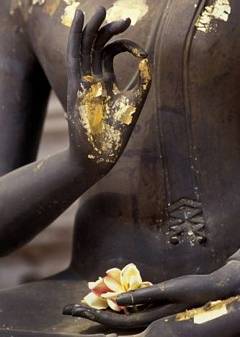 Meditation teaches us how to relate to life directly, so we can truly experience the present moment, free from conceptual overlay. Whenever you make distinctions, your mind is in opposition. If your mind is free from the environment, not bounded by mental realms, then your next birth will not be dictated by karma but rather by your own decision. Does a given individual’s religion accommodate to break his will, keep him at an infantile level of development, and enable him to evade the solicitousness of liberation and personal responsibility?
Meditation teaches us how to relate to life directly, so we can truly experience the present moment, free from conceptual overlay. Whenever you make distinctions, your mind is in opposition. If your mind is free from the environment, not bounded by mental realms, then your next birth will not be dictated by karma but rather by your own decision. Does a given individual’s religion accommodate to break his will, keep him at an infantile level of development, and enable him to evade the solicitousness of liberation and personal responsibility?
On the other hand, does it accommodate him as a substructure of designation, which affirms his dignity and worth, which gives him a substructure for valiant acceptance of his inhibitions and mundane solicitousness, but which avails him develop his potencies, his responsibility, and his capacity to dote his fellow men? The only difference is that there is no obstruction or attachment in their minds. You have to be careful and meticulous. For example, if everybody were male, the label “men” would no longer be paramount, since its only purport is to distinguish men from women. The ordinary person does not know this.
Being too good might mean ending up being too bitter. However, this repose is only relative. Do not concern yourself with anything going on around you.
Zen Koan: “Sound of One Hand” Parable
The master of Kennin temple was Mokurai, Silent Thunder. He had a little protege named Toyo who was only twelve years old. Toyo saw the older disciples visit the master’s room each morning and evening to receive instruction in sanzen or personal guidance in which they were given koans to stop mind-wandering.
Toyo wished to do sanzen also.
“Wait a while,” said Mokurai. “You are too young.”
But the child insisted, so the teacher finally consented.
In the evening little Toyo went at the proper time to the threshold of Mokurai’s sanzen room. He struck the gong to announce his presence, bowed respectfully three times outside the door, and went to sit before the master in respectful silence.
“You can hear the sound of two hands when they clap together,” said Mokurai. “Now show me the sound of one hand.”
Toyo bowed and went to his room to consider this problem. From his window he could hear the music of the geishas. “Ah, I have it!” he proclaimed.
The next evening, when his teacher asked him to illustrate the sound of one hand, Toyo began to play the music of the geishas.
“No, no,” said Mokurai. “That will never do. That is not the sound of one hand. You’ve not got it at all.”
Thinking that such music might interrupt, Toyo moved his abode to a quiet place. He meditated again. “What can the sound of one hand be?” He happened to hear some water dripping. “I have it,” imagined Toyo.
When he next appeared before his teacher, Toyo imitated dripping water.
“What is that?” asked Mokurai. “That is the sound of dripping water, but not the sound of one hand. Try again.”
In vain Toyo meditated to hear the sound of one hand. He heard the sighing of the wind. But the sound was rejected.
He heard the cry of an owl. This also was refused.
The sound of one hand was not the locusts.
For more than ten times Toyo visited Mokurai with different sounds. All were wrong. For almost a year he pondered what the sound of one hand might be.
At last little Toyo entered true meditation and transcended all sounds. “I could collect no more,” he explained later, “so I reached the soundless sound.”
Toyo had realized the sound of one hand.
Buddhist Insight on Awakening
Buddhism teaches the need for clear thinking, awakening, self-control, self-help, and meditation. It’s much better to have that all happen than have it all still, solid and barricaded. The feelings of insecurity and unrest will dissolve and life will be more meaningful, happy, and interesting if there is someone who is willing to share another’s burden. Awakening is the object of abstract kindness in all beings. The American Zen priest Melissa Myozen Blacker wrote in The Book of Mu: Essential Writings on Zen’s Most Important Koan,
The natural ripening of a person on this path may be so gradual as to be unnoticed, or so sudden as to feel like an explosion. Trusting this process of awakening, we begin to taste the experience of oneness, which is frankly indescribable. No matter how hard we try, we can’t communicate this feeling, which is so unlike our previous life, our familiar construction of reality, that we may liken it to dreaming. But we have actually woken up to our true life, and we are struck dumb, wordless, in an experience that can’t be described by the ordinary words we have used all our lives. It feels impossible to talk about this new, freshly felt life of realization, which is so amazing in its simplicity and ordinariness. The subtlety of this part of the path is misleading because it is actually not at all subtle. The profundity of the shift in consciousness, when outer and inner become one, must be lived, not described – but recognized, of course, by others on the same path.